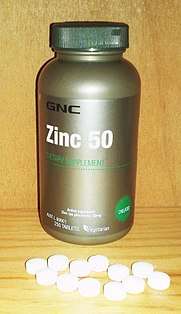Zinc and the common cold
Zinc supplements (frequently zinc acetate or zinc gluconate lozenges) are a group of dietary supplements that are commonly used for the treatment of the common cold.[1] The use of zinc supplements at doses in excess of 75 mg/day within 24 hours of the onset of symptoms has been shown to reduce the duration of cold symptoms by about 1 day in adults.[1][2] Adverse effects with zinc supplements by mouth include bad taste and nausea.[1][2] The intranasal use of zinc-containing nasal sprays has been associated with the loss of the sense of smell;[1] consequently, in June 2009, the United States Food and Drug Administration (USFDA) warned consumers to stop using intranasal zinc.[1]

The human rhinovirus – the most common viral pathogen in humans – is the predominant cause of the common cold.[3] The hypothesized mechanism of action by which zinc reduces the severity and/or duration of cold symptoms is the suppression of nasal inflammation and the direct inhibition of rhinoviral receptor binding and rhinoviral replication in the nasal mucosa.[1]
Effectiveness
A 2017 meta-analysis comparing zinc acetate-lozenges with zinc gluconate lozenges in 575 patients found that colds were 33% shorter with zinc lozenge usage and no difference across lozenge type nor did the study find evidence for doses over 100 mg/day leading to higher efficacy.[4]
A 2016 meta-analysis on zinc acetate-lozenges and the common cold in 199 patients found that colds were 2.7 days shorter by zinc lozenge usage. This estimate is to be compared with the 7 day average duration of colds in the three trials.[5]
A 2015 meta-analysis on zinc lozenges and the common cold found no difference in the effects of zinc acetate lozenges on diverse respiratory symptoms. Although zinc lozenges most probably lead to highest concentration of zinc in the pharyngeal region, a subsequent meta-analysis showed that the effects of high-dose zinc acetate lozenges did not significantly differ in their effects on pharyngeal and nasal symptoms. The duration of nasal discharge was shortened by 34%, nasal congestion by 37%, sneezing by 22%, scratchy throat by 33%, sore throat by 18%, hoarseness by 43%, and cough by 46%. Zinc lozenges shortened the duration of muscle ache by 54%, but there was no significant effect on the duration of headache and fever.[6]
A withdrawn 2013 review found that zinc supplementation at doses in excess of 75 mg/day within 24 hours of the onset of cold symptoms reduced the average duration of symptoms by 1 day.[7] It also found that the likelihood of experiencing cold symptoms 1 week after the onset of symptoms was lower in individuals who used supplemental zinc relative to those who did not.[7]
A 2012 systematic review suggested that "zinc formulations may shorten the duration of symptoms of the common cold" in adults, but that further research was needed and that possible adverse effects needed to be studied.[2]
Safety
There have been several cases of people using zinc nasal sprays and suffering a loss of sense of smell.[1] In 2009 the US Food and Drug Administration issued a warning that people should not use nasal sprays containing zinc.[1]
Adverse effects of lozenges include bad taste and nausea.[1][7]
Mechanism of action
The human rhinovirus – the most common viral pathogen in humans – is the predominant cause of the common cold.[3] The hypothesized mechanism of action by which zinc reduces the severity and/or duration of cold symptoms is the suppression of nasal inflammation and the direct inhibition of rhinoviral receptor binding and rhinoviral replication in the nasal mucosa.[1] Zinc has been known for many years to have an effect on cold viruses in the laboratory.[8]
Chemistry
Some lozenge formulations do not contain enough zinc to effectively reduce the lengths of colds; some of them contain ingredients that bind zinc, like citric acid, which prevent the zinc from working.[5]
References
- "Zinc – Fact Sheet for Health Professionals". Office of Dietary Supplements, US National Institutes of Health. February 11, 2016. Retrieved January 7, 2018.
- Science M, Johnstone J, Roth DE, Guyatt G, Loeb M (July 2012). "Zinc for the treatment of the common cold: a systematic review and meta-analysis of randomized controlled trials". CMAJ. 184 (10): E551-61. doi:10.1503/cmaj.111990. PMC 3394849. PMID 22566526.
- "Common Cold and Runny Nose". United States Centers for Disease Control and Prevention. September 26, 2017. Retrieved January 7, 2018.
- Hemilä H (May 2017). "Zinc lozenges and the common cold: a meta-analysis comparing zinc acetate and zinc gluconate, and the role of zinc dosage". JRSM Open. 8 (5): 2054270417694291. doi:10.1177/2054270417694291. PMC 5418896. PMID 28515951.
- Hemilä H, Petrus EJ, Fitzgerald JT, Prasad A (November 2016). "Zinc acetate lozenges for treating the common cold: an individual patient data meta-analysis". British Journal of Clinical Pharmacology. 82 (5): 1393–1398. doi:10.1111/bcp.13057. PMC 5061795. PMID 27378206.
- Hemilä H, Chalker E (February 2015). "The effectiveness of high dose zinc acetate lozenges on various common cold symptoms: a meta-analysis". BMC Family Practice. 16: 24. doi:10.1186/s12875-015-0237-6. PMC 4359576. PMID 25888289.
- Singh M, Das RR (June 2013). Singh M (ed.). "Zinc for the common cold". The Cochrane Database of Systematic Reviews (6): CD001364. doi:10.1002/14651858.CD001364.pub4. PMID 23775705. (Retracted, see doi:10.1002/14651858.cd001364.pub5)
- "Zinc 'can cut length of common cold'". NHS Choices. May 8, 2012.